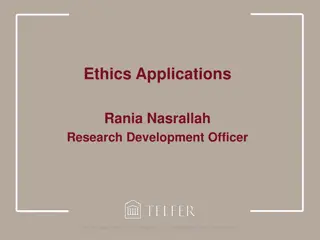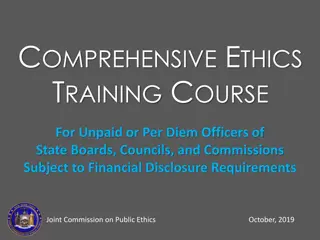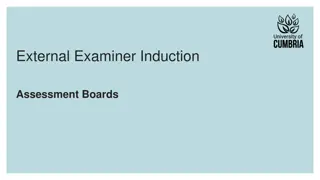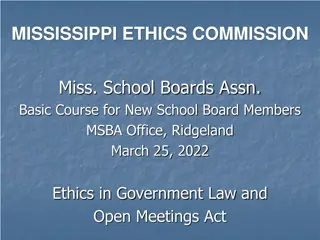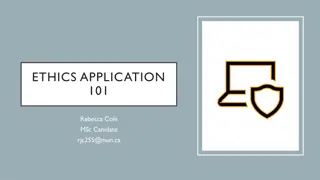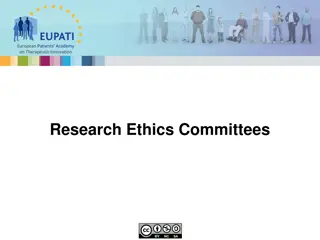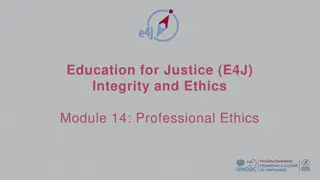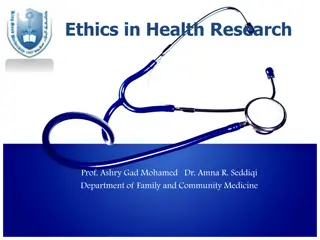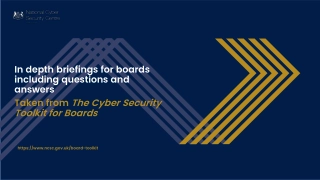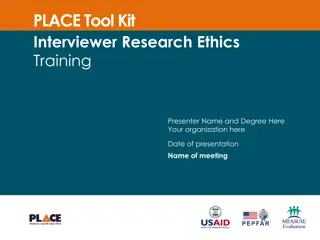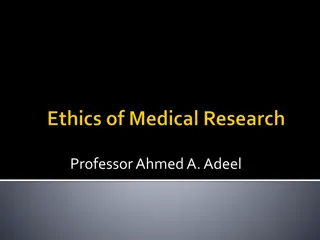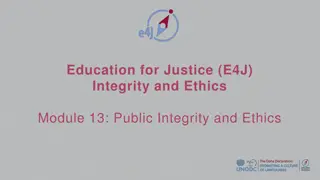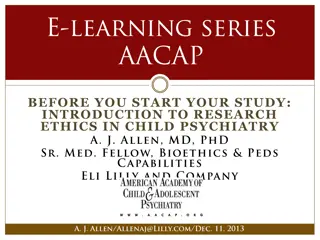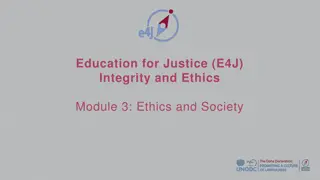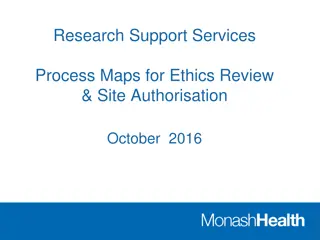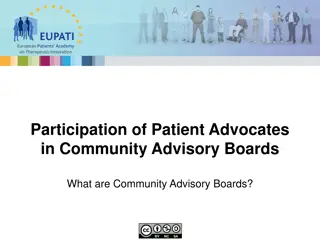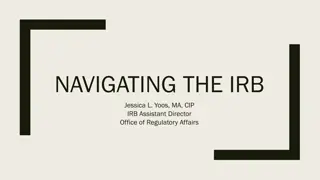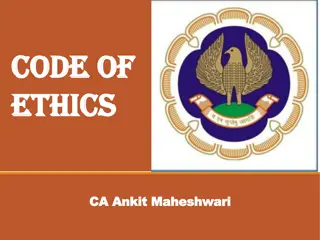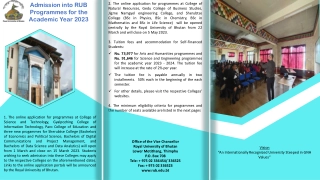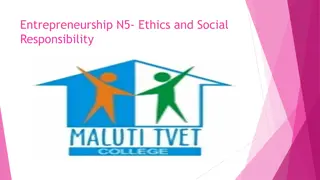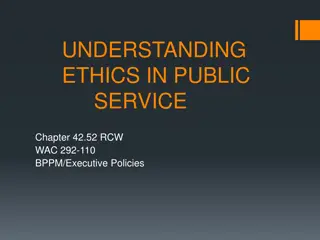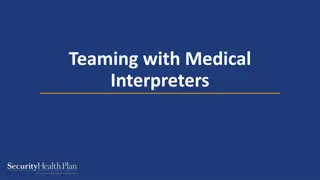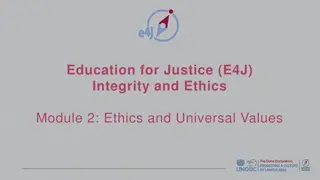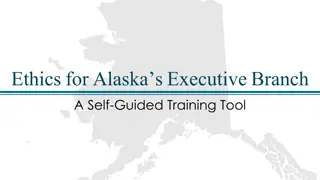Understanding the Role of Research Ethics Boards (REB) at Loyalist College
Research Ethics Boards (REBs) play a crucial role in evaluating research proposals involving human participants. At Loyalist College, the REB functions independently and ensures that research meets ethical standards detailed in the Tri-Council Policy Statement. Members of the REB, including faculty, staff, and community volunteers, uphold principles of human dignity and advocate for participant protection and respect. The mandate of the Loyalist REB is to oversee research ethics in line with established guidelines, emphasizing the importance of ethical conduct in scientific inquiry.
Download Presentation

Please find below an Image/Link to download the presentation.
The content on the website is provided AS IS for your information and personal use only. It may not be sold, licensed, or shared on other websites without obtaining consent from the author. Download presentation by click this link. If you encounter any issues during the download, it is possible that the publisher has removed the file from their server.
E N D
Presentation Transcript
Research Ethics Board November 2021
Terms Research A disciplined inquiry or investigation with the goal of gaining or extending knowledge. Ethics Principles or values used to define acceptable conduct. Ethical guidelines help distinguish between good and bad and right or wrong. Research Ethics Applying sound moral principles when conducting scientific inquiry.
What is an REB? A panel that evaluates research proposals involving human participants Deliberations & decisions are confidential REB members have a range of experience and expertise (data collection, research, science, technology, legal knowledge, ethics guidelines) Primary duty: to ensure human participants in a research study are protected and respected REB members function as advocates on behalf of human participants in a proposed study
The REB at Loyalist Functions independently from the College Receives no financial compensation Faculty and staff of the College; at least one community member (all are volunteers) Formed in 2015; meets monthly St. Lawrence College REB evaluated Loyalist applications before 2015
Who is on the Loyalist REB? A minimum of five members (faculty & staff) Two community members not affiliated with the College A chair (or co-chairs) Members must be Canadian citizens or permanent residents A list of REB members is posted at: https://loyalistappliedresearch.com/research-ethics-board-ario
Mandate of Loyalist REB Ensure research involving human participants meets standards detailed in the Tri-Council* Policy Statement on Ethical Conduct for Research Involving Human Participants https://ethics.gc.ca/eng/policy-politique_tcps2-eptc2_2018.html *Tri-Council is: Canadian Institutes of Health Research; Natural Sciences and Engineering Research Council of Canada; Social Sciences and Humanities Research Council of Canada
Tri-Council Policy Statement (TCPS 2) Policy Statement: Ethical Conduct of Research Involving Human Participants (1998, 2010, 2014) REB members must complete TCPS2 on-line training certification Website: http://tcps2core.ca/welcome Three principles define value of human dignity: Respect for persons Concern for welfare of participants Justice and Fairness
What Project Require REB Approval? Research on human subjects, including: Human tissues or biological fluids Human remains or cadavers Embryos or fetuses Studies involving human research: Conducted by College faculty, staff or students Conducted on College premises Involves use of resources/facilities at the College
What Project Require REB Approval? Continued Student- and course-based research involving human participants Researchers outside the College who wish to conduct research using any member of the College community or College resources No data collection may begin until a researcher has submitted an application to the REB and it has been approved by the REB
Projects not Requiring REB Approval Evaluations part of regular college business (Student tests/exams, employee performance review) Quality assurance studies/surveys (Key Performance Indicators; student performance rates) Usage/service surveys (e.g. a library or cafeteria survey on usage/feedback) Data collected for college decision-making (Program reviews, student course evaluations) Use of secondary data from public sources
Applying for REB Approval Step 1: Complete TCPS 2 online tutorial http://tcps2core.ca/welcome Fill out appropriate application form o Loyalist application (if study is at Loyalist only) o Or multi-site application if conducting research at more than one college Include all consent forms, information letters, questionnaires and supporting documents with application If you have questions, contact: Kurstin Salisbury Applied Research & Innovation Department (613) 969-1913, ext. 2275 ksalisbury@loyalistcollege.com
Application Process Important reminders about application process: Staff will answer basic questions about an application Staff role is not to edit, proof-read, analyze or evaluate the quality of your application or your research methodology Submit your application to staff The REB strives to review and respond to applications within two weeks (not in July and August) Multi-site REB reviews for a study at more than one college typically take longer for approval
REB Evaluation Process Types of review 1. Delegated review: if study is deemed minimal risk, REB chair and one member review 2. Full-board review: if study is deemed of higher risk, a quorum of REB members review/discuss at monthly meeting
Assessment Criteria Level of risk to participants Informed consent Precautions/considerations for vulnerable populations Safeguards: privacy and confidentiality Potential conflict of interest
Informed Consent Researchers must fully & clearly inform participants: About the purpose and nature of the research About potential risk(s) and benefit(s) to participants Their participation is entirely voluntary They may withdraw at any time, without providing a reason, without penalty That if they are not able to give informed consent, they are not eligible to participate
Informed Consent Important reminders: Consent forms must be clear and easy to understand Participants should actively choose whether or not to participate A lack of response (i.e. a statement such as: Your consent to participate will be assumed unless you indicate otherwise to the researchers ) does not qualify as informed consent Written consent is not required in all circumstances. For example, it may be acceptable to require participants click a box in an online survey or provide verbal consent
Privacy and Confidentiality Informed Consent forms must tell participants how their privacy and confidentiality will be assured Privacy of participants must be maintained during the research stage and afterwards (data collection and disposal) Data storage: locked file cabinets, locked office Limited access: coding of data, security clearance Technological safeguards: password protected, encryption, biometrics Data sent to the United States, or uploaded to U.S.-based servers (e.g. Survey Monkey), are open to access by U.S. regulatory bodies. Researchers must inform participants of this fact.
Personal Health Information PHIPA Requirements Paper files with identifiable information must be kept in a locked cabinet in a locked office (e.g. not at home) Electronic files with identifiable information must be stored on a password- protected computer on a secure network (i.e. virus protection, file backup, firewall) or they must be encrypted. Electronic files with identifiable information may be stored on mobile devices (e.g. laptop, CD, USB, PDA), but no alternative method of storage; these files must be encrypted. Identifying and/or identifiable PHI cannot be transmitted by email unless it is encrypted Coding Identifying and/or identifiable PHI must be protected by coding system The code (study ID and identifiable PHI) must be isolated from study data and stored in a secure manner
Vulnerable Populations Vulnerable populations include people: Under age 18 With intellectual difficulties or mental illness Receiving medical treatment; with on-going health issues; ini medical emergencies; in long-term care In prison Who are elderly Aboriginal people People living in poverty Otherwise unable to consent
Conflict of Interest A conflict of interest may be real, potential or perceived Conflict of interest may involve the researcher, the institution and/or participants A conflict of interest may jeopardize integrity of research Some examples: Power imbalance (boss/employee; teacher/student) Interpersonal relationship (e.g. between researcher and participant) Researcher has dual roles Financial gain or reward
Types of REB Decisions When the REB reviews your application, it will deliver one of the following decisions: Approved (You may begin data collection) Recommended for Approval (Questions from REB need to be addressed. You must submit revised application for review by REB chair & Applied Research & Innovation Department staff) Pending Approval (Significant issues/questions from REB to be addressed. Revised application must be resubmitted for review by REB.) Not approved (Applicant may appeal decision. The REB at Durham College would be the appeal board for Loyalist College.)
Website https://loyalistappliedresearch.com/research-ethics-board-ario REB Policies and Forms AOP 220: Integrity in Research and Scholarship (under review) Loyalist College REB application form Completion and Termination form Renewal and Amendment form Adverse Event form Acknowledgement of Course-Based Research with Human Participants form
Sources Sarah Matthews, Research Services Officer, Applied Research Office, St. Lawrence College, Kingston Canadian Institutes of Health Research, Natural Sciences and Engineering Research Council of Canada, Social Sciences and Humanities Research Council of Canada, Tri-Council Policy Statement: Ethical Conduct for Research Involving Humans, 2018. https://ethics.gc.ca/eng/policy-politique_tcps2-eptc2_2018.html A Guide to the Personal Health Information Protection Act, December 2004, by Ann Cavoukian, Ph.D., Information & Privacy Commissioner for Ontario. https://www.ipc.on.ca/resource/a-guide-to-the-personal-health- information-protection-act/


